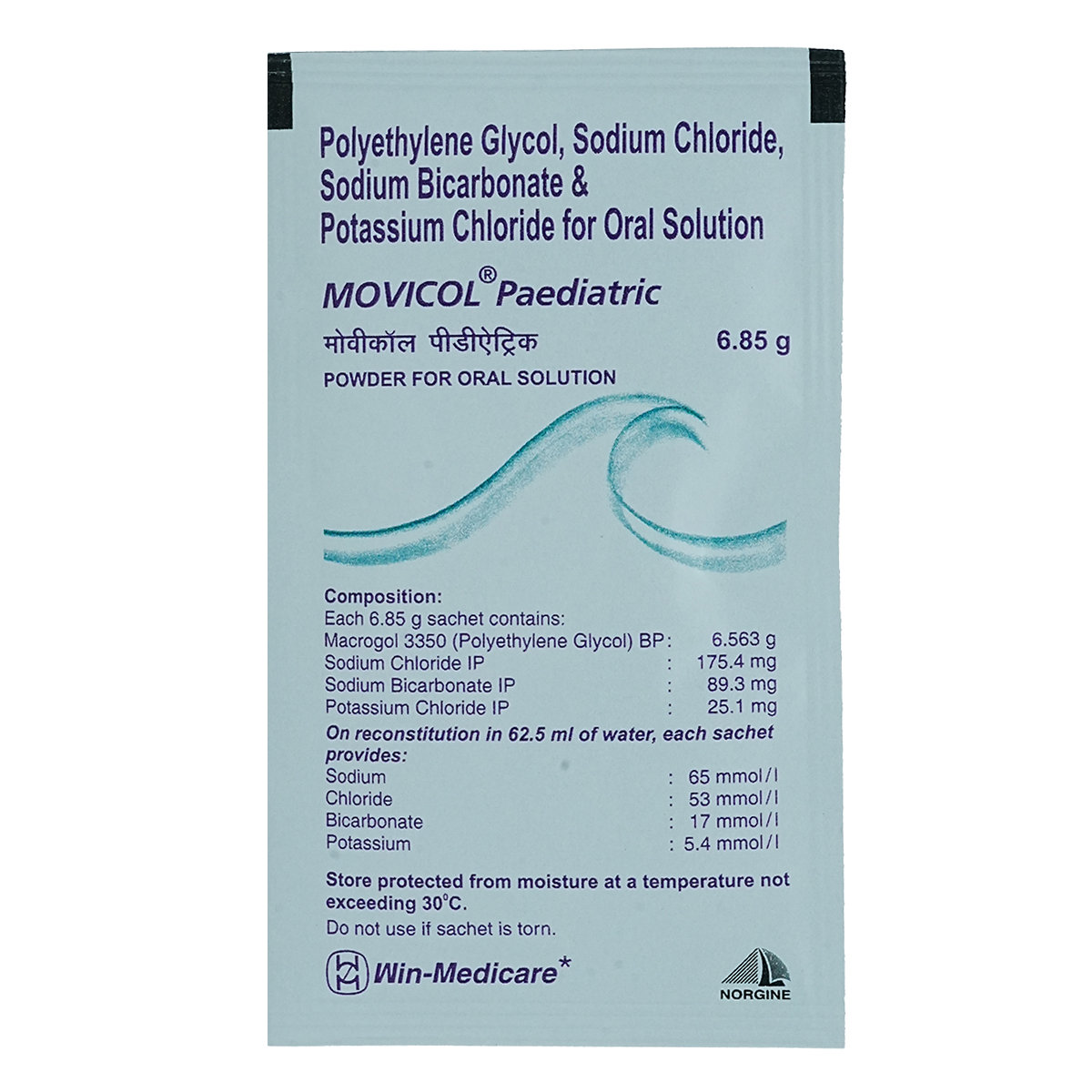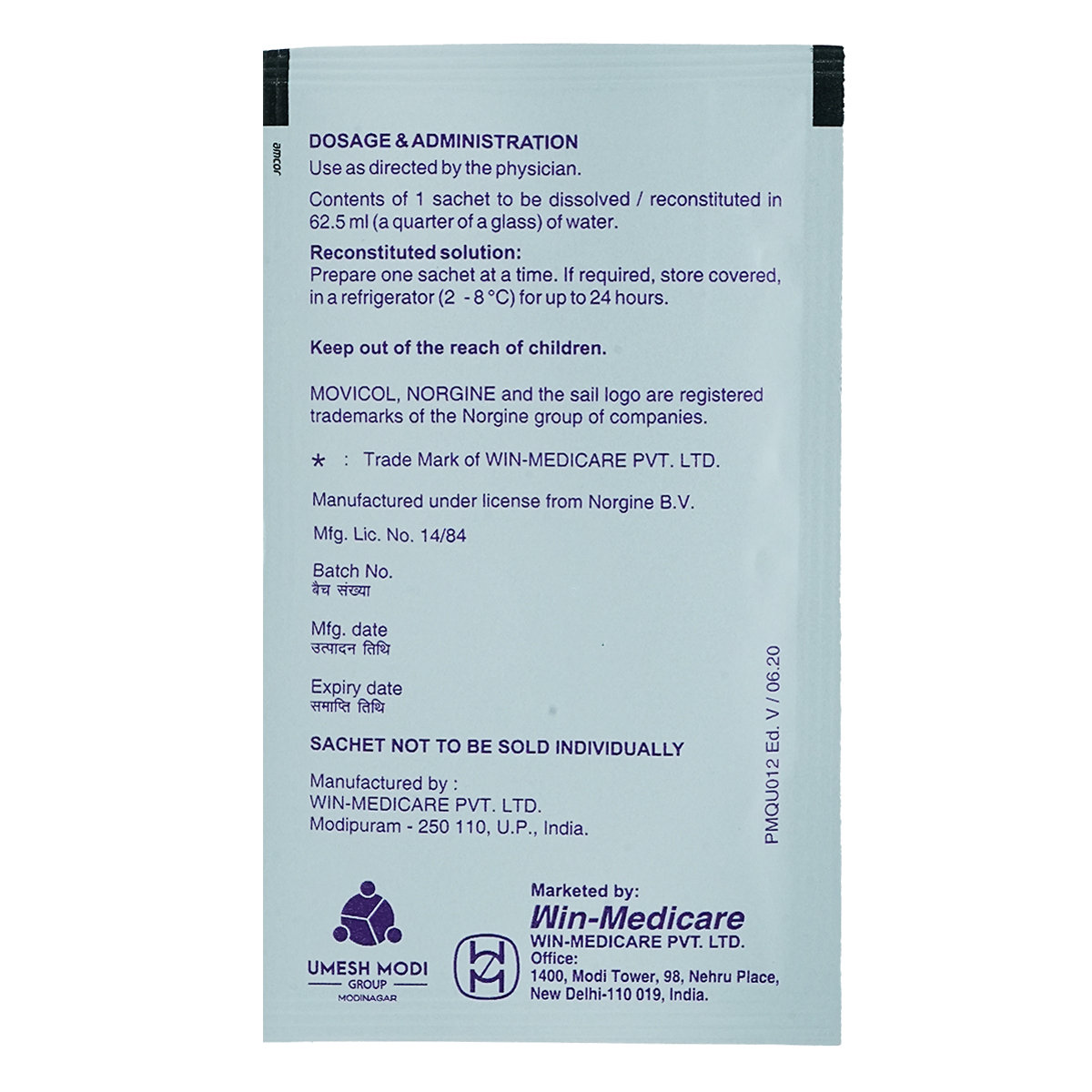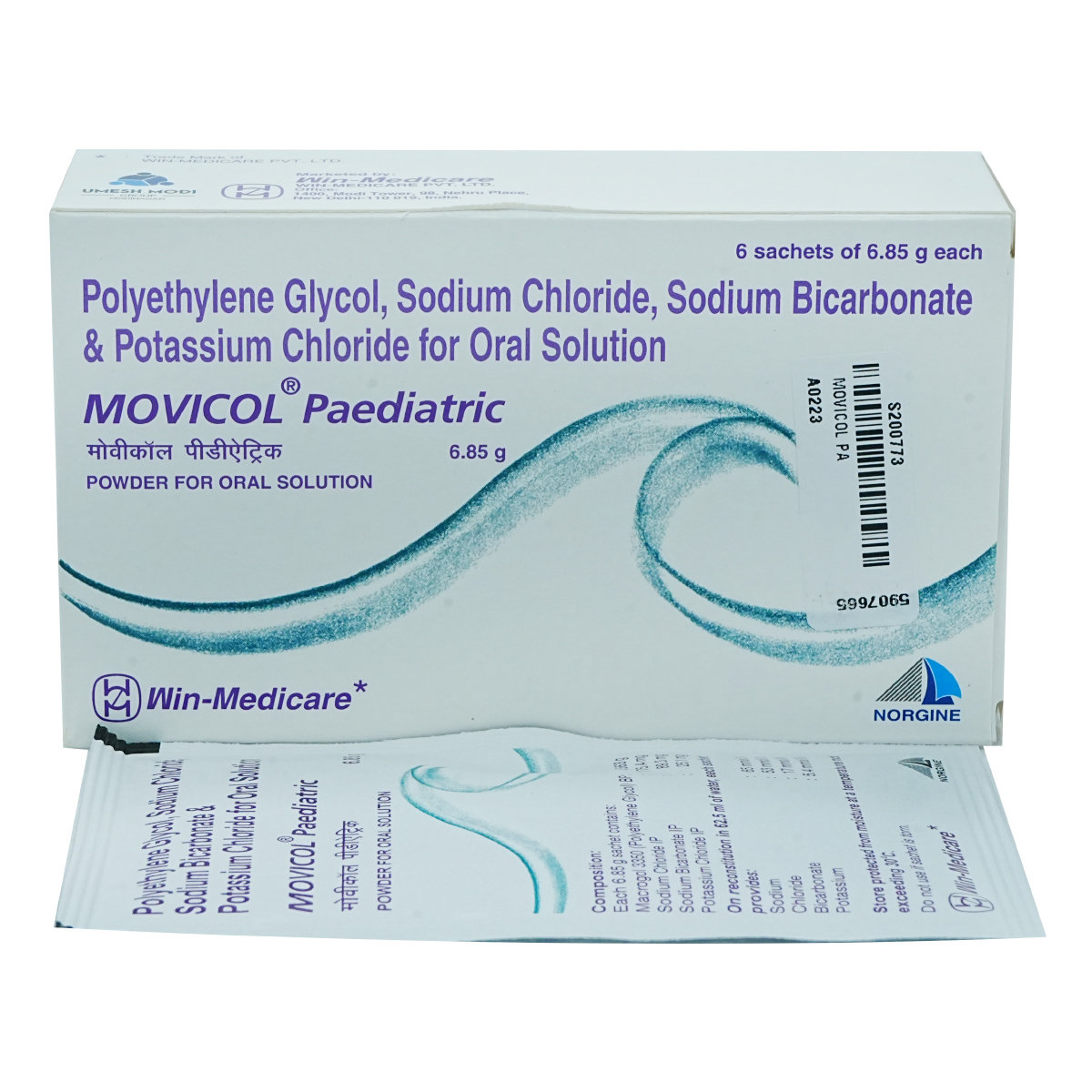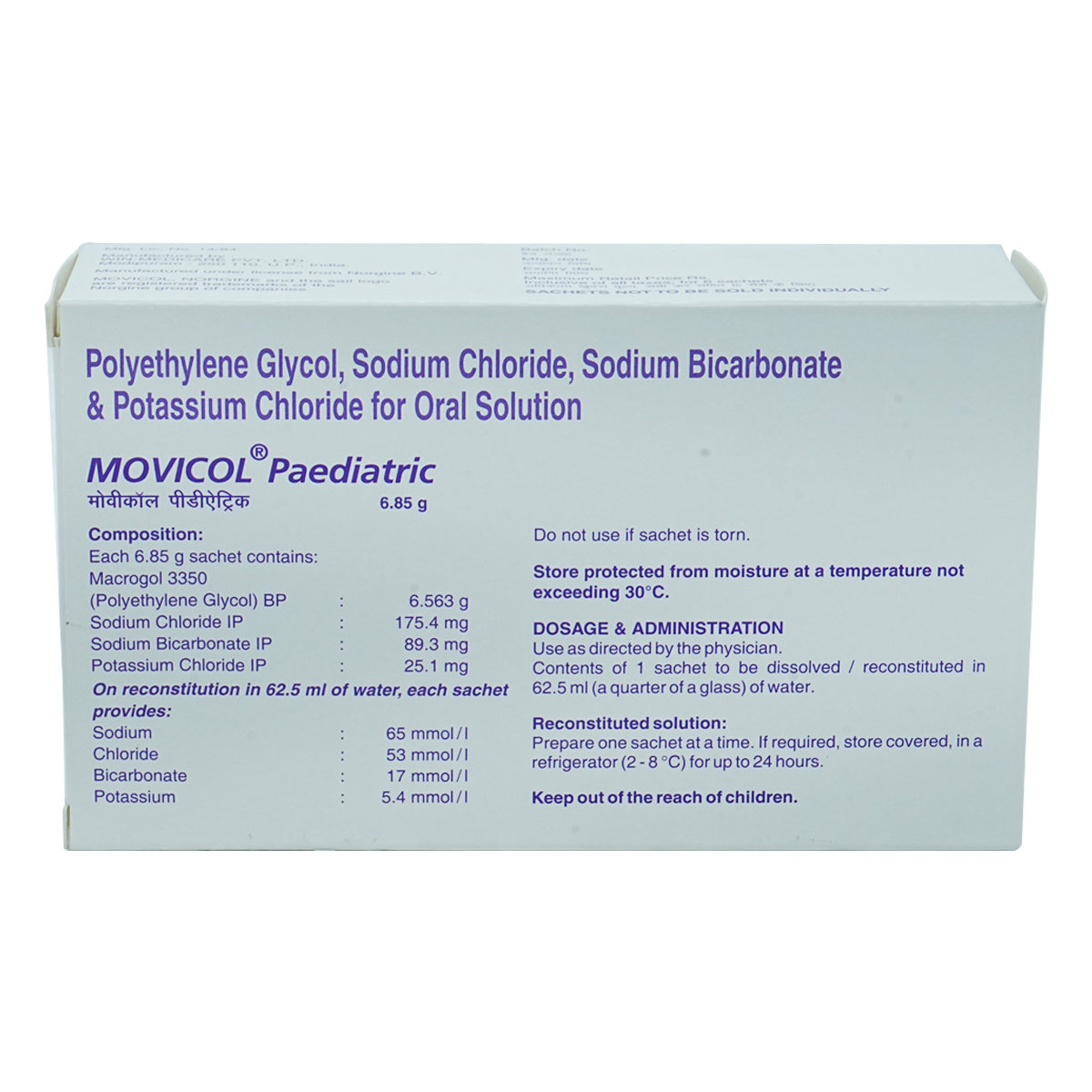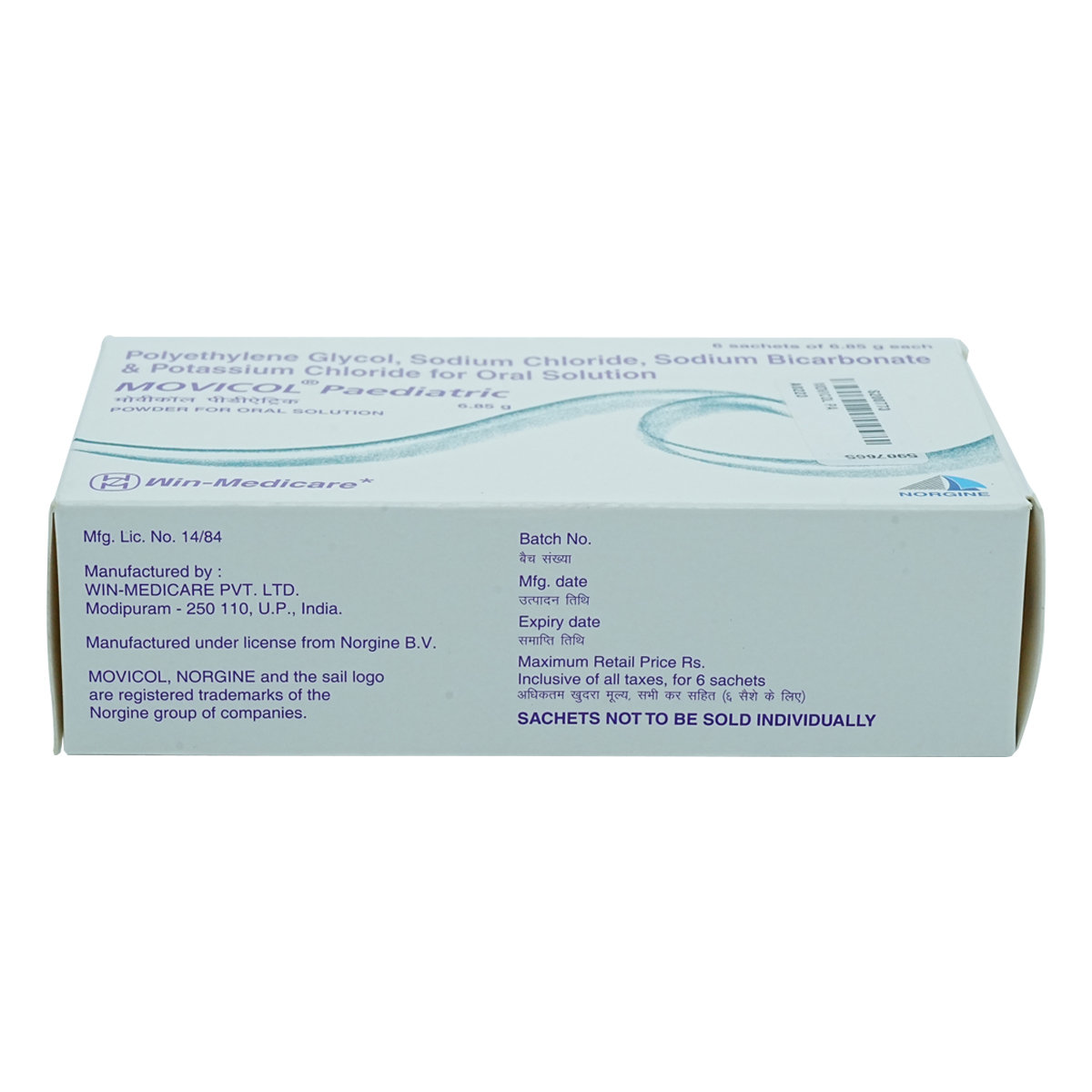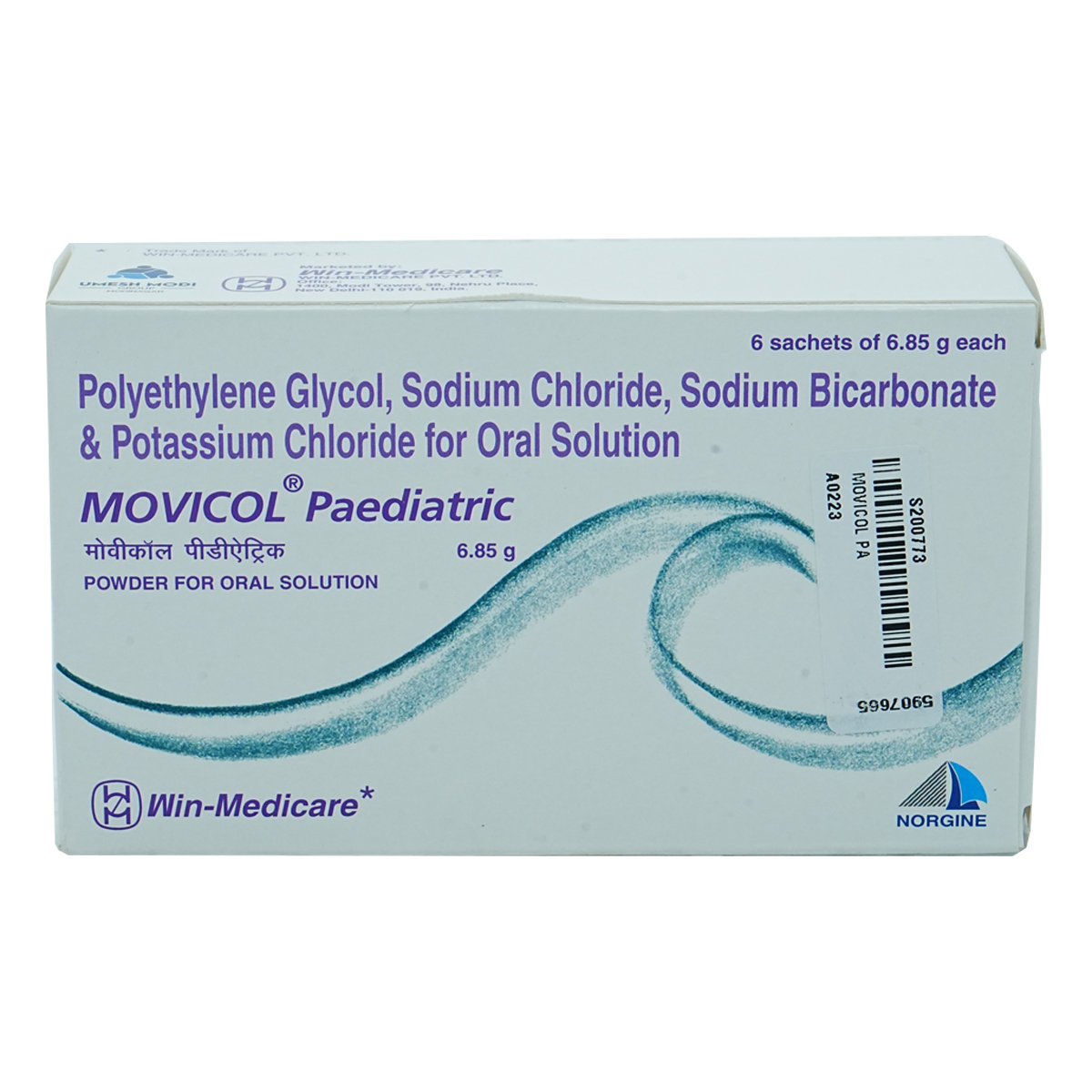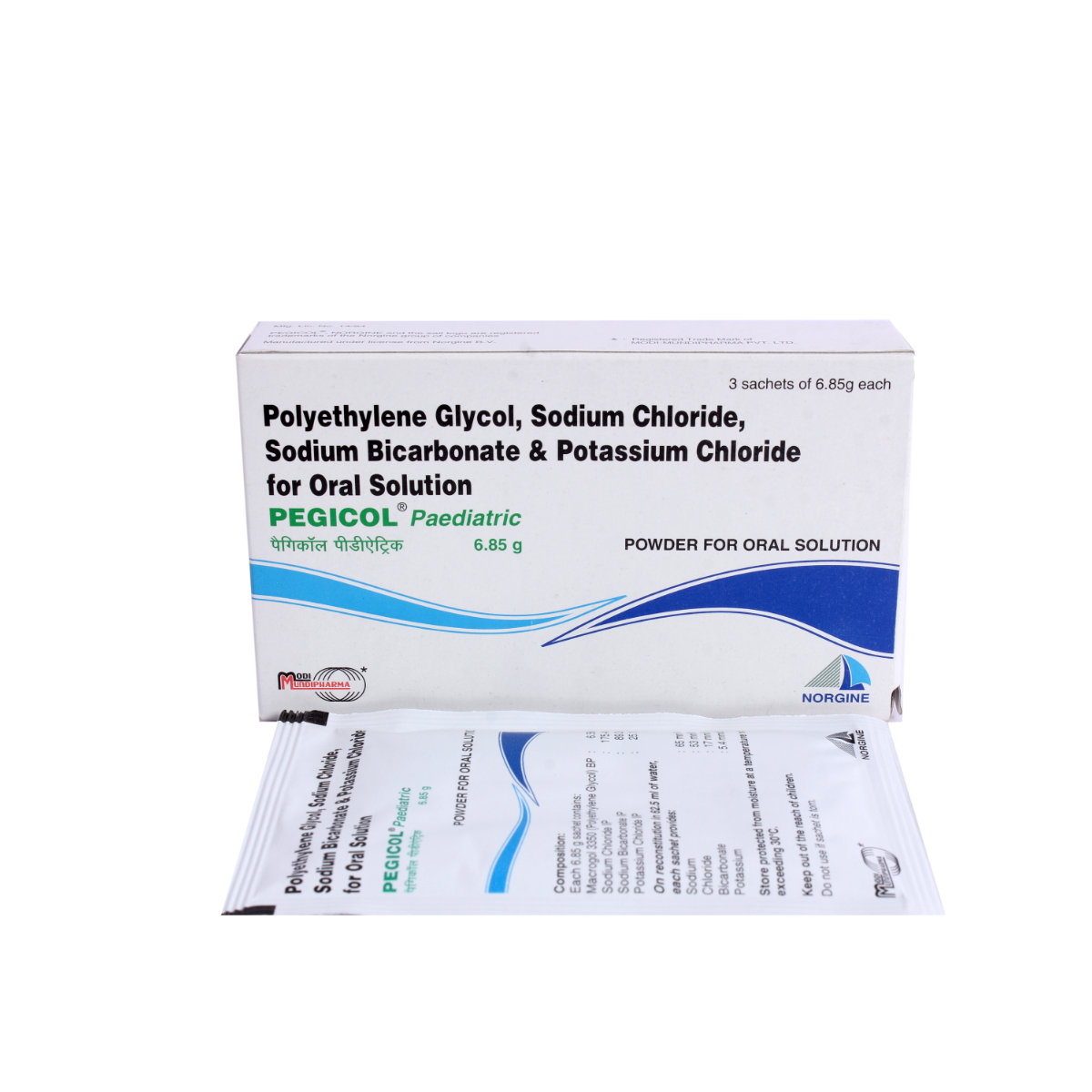Movicol Paediatric Sachet 6's
MRP ₹160
(Inclusive of all Taxes)
₹24.0 Cashback (15%)
Selected Pack Size:6
6 ₹144
(₹24.0 per unit)
In Stock
About Movicol Paediatric Sachet
Movicol Paediatric Sachet belongs to a class of drugs called laxatives used to treat constipation. Constipation refers to infrequent bowel movements in which the stools are often dry, painful, and hard to pass.
Movicol Paediatric Sachet is a combination of four drugs, namely: Polyethylene glycol, Potassium chloride, Sodium bicarbonate, and Sodium chloride. Polyethylene glycol draws water into the intestine and softens stools making them easier to pass. Potassium chloride is essential for healthy organ functioning. Sodium bicarbonate works by suppressing high levels of acid in the stomach and helps to treat acidity and heartburn. Sodium chloride maintains sodium levels in the body. Together, Movicol Paediatric Sachet helps in relieving constipation.
Take Movicol Paediatric Sachet as advised by your doctor. In some cases, you may experience stomach pain, indigestion, mild diarrhea, nausea, or vomiting. Most of these side effects of Movicol Paediatric Sachet do not require medical attention and gradually resolve over time. However, if the side effects persist or worsen, please consult your doctor.
If you are allergic to Movicol Paediatric Sachet or any other medicines, please tell your doctor. If you have ulcerative colitis or Crohn’s disease, inform your doctor before taking Movicol Paediatric Sachet. Movicol Paediatric Sachet is not recommended for children below 12 years of age. If you are pregnant or breastfeeding, please consult a doctor before taking Movicol Paediatric Sachet. Drink plenty of fluids while taking Movicol Paediatric Sachet. Do not take Movicol Paediatric Sachet in more than the recommended doses.
Country of origin
Manufacturer/Marketer address
Online payment accepted

secured payment

india's most trusted pharmacy

genuine products
Manufacturer/Marketer :
Consume Type :
Expires on or after :
Return Policy :
Provide Delivery Location
About Movicol Paediatric Sachet
Movicol Paediatric Sachet belongs to a class of drugs called laxatives used to treat constipation. Constipation refers to infrequent bowel movements in which the stools are often dry, painful, and hard to pass.
Movicol Paediatric Sachet is a combination of four drugs, namely: Polyethylene glycol, Potassium chloride, Sodium bicarbonate, and Sodium chloride. Polyethylene glycol draws water into the intestine and softens stools making them easier to pass. Potassium chloride is essential for healthy organ functioning. Sodium bicarbonate works by suppressing high levels of acid in the stomach and helps to treat acidity and heartburn. Sodium chloride maintains sodium levels in the body. Together, Movicol Paediatric Sachet helps in relieving constipation.
Take Movicol Paediatric Sachet as advised by your doctor. In some cases, you may experience stomach pain, indigestion, mild diarrhea, nausea, or vomiting. Most of these side effects of Movicol Paediatric Sachet do not require medical attention and gradually resolve over time. However, if the side effects persist or worsen, please consult your doctor.
If you are allergic to Movicol Paediatric Sachet or any other medicines, please tell your doctor. If you have ulcerative colitis or Crohn’s disease, inform your doctor before taking Movicol Paediatric Sachet. Movicol Paediatric Sachet is not recommended for children below 12 years of age. If you are pregnant or breastfeeding, please consult a doctor before taking Movicol Paediatric Sachet. Drink plenty of fluids while taking Movicol Paediatric Sachet. Do not take Movicol Paediatric Sachet in more than the recommended doses.
Uses of Movicol Paediatric Sachet
Key Benefits
Movicol Paediatric Sachet contains Polyethylene glycol, Potassium chloride, Sodium bicarbonate and Sodium chloride. Polyethylene glycol draws water into the intestine and softens stools making them easier to pass. Also, it works by cleaning stool from the gastrointestinal tract. Potassium chloride is essential for healthy organ functioning. Sodium bicarbonate works by suppressing high levels of acid in the stomach and helps to treat acidity and heartburn. Sodium chloride maintains sodium levels in the body. Together, Movicol Paediatric Sachet helps in comfortable bowel movement and provides relief from constipation.
Directions for Use
Storage
Side Effects of Movicol Paediatric Sachet
- Stomach pain
- Indigestion
- Mild diarrhoea
- Nausea
- Vomiting
Drug Warnings
If you are allergic to Movicol Paediatric Sachet or any other medicines, please tell your doctor. If you have ulcerative colitis or Crohn’s disease, inform your doctor before taking Movicol Paediatric Sachet. Movicol Paediatric Sachet is not recommended for children below 12 years of age. If you are pregnant or breastfeeding, please consult a doctor before taking Movicol Paediatric Sachet. Drink plenty of fluids while taking Movicol Paediatric Sachet. Do not take Movicol Paediatric Sachet in more than the recommended doses. Discard Movicol Paediatric Sachet after 30 days of first opening the bottle. Do not freeze or refrigerate Movicol Paediatric Sachet.
Drug Interactions
Drug-Drug Interaction: Movicol Paediatric Sachet may interact with anticonvulsants (phenytoin, carbamazepine).
Drug-Food Interaction: No interactions found.
Drug-Disease Interaction: If you have fecal impaction (hardened stool stuck in the colon or rectum due to chronic constipation), blockage in the intestine, a perforated gut wall, toxic megacolon (widening of the large intestine), ulcerative colitis or Crohn’s disease, inform your doctor before taking Movicol Paediatric Sachet.
Drug-Drug Interactions Checker List
- PHENYTOIN
- CARBAMAZEPINE
Habit Forming
Diet & Lifestyle Advise
- Try maintaining a balanced diet, which includes fresh fruits and vegetables.
- Stay hydrated, drink enough water and fluids.
- Exercise regularly, and stay fit.
- Get enough sleep.
- Eat food rich in fiber such as whole-wheat bread, oatmeal, flaxseed, nuts, beans, lentils, fruits (berries, apples, oranges, bananas, pears, figs), and vegetables (broccoli, spinach, sweet potatoes, avocados).
Disease/Condition Glossary
Constipation: It refers to infrequent bowel movements in which stools are often dry, painful, and hard to pass. Constipation is a condition in which the person has fewer than three bowel movements in a week. However, bowel patterns may vary from person to person. Symptoms include bloating, abdominal pain, and feeling as if the bowel movement is incomplete. Constipation occurs when the large intestine's normal muscle contractions slow down, which causes the incomplete elimination of the bowel from the body. Constipation could be associated with a sudden change of diet, a diet with less fiber, not drinking enough liquids, and a lack of exercise.
FAQs
Disclaimer
Alcohol
Safe if prescribed
Interaction of alcohol with Movicol Paediatric Sachet is unknown. Please consult a doctor before consuming alcohol while using Movicol Paediatric Sachet.
Pregnancy
Consult your doctor
Please consult a doctor if you are pregnant. Movicol Paediatric Sachet is given to pregnant women only if the doctor thinks the benefits outweigh the risks.
Breast Feeding
Consult your doctor
Please consult a doctor if you are breastfeeding. Movicol Paediatric Sachet is given to breastfeeding mothers only if the doctor thinks the benefits outweigh the risks.
Driving
Safe if prescribed
Movicol Paediatric Sachet usually does not affect your ability to drive or operate machinery.
Liver
Consult your doctor
Take Movicol Paediatric Sachet with caution, especially if you have a history of Liver diseases/conditions. The dose may be adjusted by your doctor as required.
Kidney
Consult your doctor
Take Movicol Paediatric Sachet with caution, especially if you have a history of Kidney diseases/conditions. The dose may be adjusted by your doctor as required.
Children
Safe if prescribed
Movicol Paediatric Sachet is not recommended for children below 12 years of age as the safety and effectiveness were not established.
Author Details
We provide you with authentic, trustworthy and relevant information
Uses of Movicol Paediatric Sachet
Key Benefits
Movicol Paediatric Sachet contains Polyethylene glycol, Potassium chloride, Sodium bicarbonate and Sodium chloride. Polyethylene glycol draws water into the intestine and softens stools making them easier to pass. Also, it works by cleaning stool from the gastrointestinal tract. Potassium chloride is essential for healthy organ functioning. Sodium bicarbonate works by suppressing high levels of acid in the stomach and helps to treat acidity and heartburn. Sodium chloride maintains sodium levels in the body. Together, Movicol Paediatric Sachet helps in comfortable bowel movement and provides relief from constipation.
- Drink water or other clear fluids.
- To prevent worsening of pain, limit intake of tea, coffee, or alcohol.
- Include bland foods like rice, toast, crackers, and rice in your diet.
- Avoid lying down immediately after eating as it may cause indigestion or heartburn.
- Avoid acidic and spicy food as it may cause indigestion.
- Inform Your Doctor: Notify your doctor immediately about your diarrhoea symptoms. This allows them to adjust your medication or provide guidance on managing side effects.
- Stay Hydrated: Drink plenty of fluids to replace lost water and electrolytes. Choose water, clear broth, and electrolyte-rich drinks. Avoid carbonated or caffeinated beverages to effectively rehydrate your body.
- Follow a Bland Diet: Eat easy-to-digest foods to help firm up your stool and settle your stomach. Try incorporating bananas, rice, applesauce, toast, plain crackers, and boiled vegetables into your diet.
- Avoid Trigger Foods: Steer clear of foods that can worsen diarrhoea, such as spicy, fatty, or greasy foods, high-fibre foods, and dairy products (especially if you're lactose intolerant).
- Practice Good Hygiene: Maintain good hygiene to prevent the spread of infection. To stay healthy, wash your hands frequently, clean and disinfect surfaces regularly, and avoid exchanging personal belongings with others.
- Take Anti-Diarrheal Medications: If your doctor advises, anti-diarrheal medications such as loperamide might help manage diarrhoea symptoms. Always follow your doctor's directions.
- Keep track of your diarrhoea symptoms. If they don't get better or worse or are accompanied by severe stomach pain, blood, or dehydration signs (like extreme thirst or dark urine), seek medical help.
- Preventing Vomiting (Before it Happens)
- Take medication exactly as prescribed by your doctor. This can help minimize side effects, including vomiting.
- Having a small meal before taking your medication can help reduce nausea and vomiting.
- Talk to your doctor about taking anti-nausea medication along with your prescribed medication.
- Managing Vomiting (If it Happens)
- Try taking ginger in the form of tea, ale, or candy to help alleviate nausea and vomiting.
- What to Do if Vomiting Persists
- Consult your doctor if vomiting continues or worsens, consult the doctor for guidance on adjusting your medication or additional treatment.
- Inform your doctor about the nausea and discuss possible alternatives to the medication or adjustments to the dosage.
- Divide your daily food intake into smaller, more frequent meals to reduce nausea.
- Opt for bland, easily digestible foods like crackers, toast, plain rice, bananas, and applesauce.
- Avoid certain foods that can trigger nausea, such as fatty, greasy, spicy, and smelly foods.
- Drink plenty of fluids, such as water, clear broth, or electrolyte-rich beverages like coconut water or sports drinks.
- Use ginger (tea, ale, or candies) to help relieve nausea.
- Get adequate rest and also avoid strenuous activities that can worsen nausea.
- Talk to your doctor about taking anti-nausea medication if your nausea is severe.
- Record when your nausea occurs, what triggers it, and what provides relief to help you identify patterns and manage your symptoms more effectively.
- Report the itching to your doctor immediately; they may need to change your medication or dosage.
- Use a cool, damp cloth on the itchy area to help soothe and calm the skin, reducing itching and inflammation.
- Keep your skin hydrated and healthy with gentle, fragrance-free moisturizers.
- Try not to scratch, as this can worsen the itching and irritate your skin.
- If your doctor prescribes, you can take oral medications or apply topical creams or ointments to help relieve itching.
- Track your itching symptoms and follow your doctor's guidance to adjust your treatment plan if needed. If the itching persists, consult your doctor for further advice.
- Hydrate your body: Drink enough water to prevent dehydration and headaches.
- Calm Your Mind: Deep breathing and meditation can help you relax and relieve stress.
- Rest and Recharge: Sleep for 7-8 hours to reduce headache triggers.
- Take rest: lie down in a quiet, dark environment.
- Cold or warm compresses can help reduce tension.
- Stay Upright: Maintain good posture to keep symptoms from getting worse.
- To treat headaches naturally, try acupuncture or massage therapy.
- Over-the-counter pain relievers include acetaminophen and ibuprofen.
- Prescription Assistance: Speak with your doctor about more substantial drug alternatives.
- Severe Headaches: Seek emergency medical assistance for sudden, severe headaches.
- Frequent Headaches: If you get reoccurring headaches, consult your doctor.
- Headaches with Symptoms: Seek medical attention if your headaches include fever, disorientation, or weakness.
Directions for Use
Storage
Drug Warnings
If you are allergic to Movicol Paediatric Sachet or any other medicines, please tell your doctor. If you have ulcerative colitis or Crohn’s disease, inform your doctor before taking Movicol Paediatric Sachet. Movicol Paediatric Sachet is not recommended for children below 12 years of age. If you are pregnant or breastfeeding, please consult a doctor before taking Movicol Paediatric Sachet. Drink plenty of fluids while taking Movicol Paediatric Sachet. Do not take Movicol Paediatric Sachet in more than the recommended doses. Discard Movicol Paediatric Sachet after 30 days of first opening the bottle. Do not freeze or refrigerate Movicol Paediatric Sachet.
Therapeutic Class
Drug-Drug Interactions
Drug-Drug Interactions
Login/Sign Up
Taking Mepenzolate and Movicol Paediatric Sachet(in tablet or capsule form) together can increase the risk of stomach ulcers, bleeding, and other gastrointestinal injury.
How to manage the interaction:
Taking Mepenzolate with Movicol Paediatric Sachet is not recommended, as it can lead to an interaction, it can be taken if a doctor has prescribed it. However, if you experience severe stomach pain, bloating, sudden lightheadedness or dizziness, nausea, vomiting (especially with blood), decreased hunger, dark, tarry stools, consult the doctor immediately.
Taking Cyproheptadine with Movicol Paediatric Sachet can increase the risk of stomach ulcers.
How to manage the interaction:
Taking Cyproheptadine with Movicol Paediatric Sachet is not recommended, as it can lead to an interaction, can be taken if your doctor has prescribed it. However, if you experience severe stomach pain, bloating, sudden lightheadedness or dizziness, nausea, vomiting (especially with blood), decreased hunger, dark, tarry stools, consult the doctor immediately. Do not stop any medication without talking to a doctor.
Taking Difenoxin and Movicol Paediatric Sachet (in tablet or capsule form) together can increase the risk of stomach ulcers, bleeding, and other gastrointestinal injury.
How to manage the interaction:
Taking Difenoxin with Movicol Paediatric Sachet is not recommended, as it can lead to an interaction, it can be taken if a doctor has prescribed it. However, if you experience severe stomach pain, bloating, sudden lightheadedness or dizziness, nausea, vomiting (especially with blood), decreased hunger, dark, tarry stools, consult the doctor immediately.
Taking Procyclidine and Movicol Paediatric Sachet together can increase the risk of stomach ulcers.
How to manage the interaction:
Taking Procyclidine with Movicol Paediatric Sachet is not recommended, but it can be taken together if advised by a doctor. However, if you experience severe stomach pain, bloating, sudden lightheadedness or dizziness, nausea, vomiting (especially with blood), decreased hunger, or dark, tarry stools, consult the doctor immediately. Do not discontinue any medications without a doctor's advice.
Taking Doxepin with Movicol Paediatric Sachet can increase the risk of stomach ulcers.
How to manage the interaction:
Taking Doxepin with Movicol Paediatric Sachet is not recommended, as it can lead to an interaction, but it can be taken if a doctor has prescribed it. However, if you experience severe stomach pain, bloating, sudden lightheadedness or dizziness, nausea, vomiting (especially with blood), loss of appetite, or dark, tarry stools, consult the doctor immediately. Do not discontinue any medications without a doctor's advice.
Taking Tolterodine and Movicol Paediatric Sachet together can increase the risk of side effects.
How to manage the interaction:
Although there is an interaction between Tolterodine and Movicol Paediatric Sachet, they can be taken if prescribed by a doctor. However, contact a doctor immediately if you develop severe abdominal pain, bloating, sudden dizziness or lightheadedness, nausea, vomiting (especially with blood), or less desire to eat. Do not discontinue medications without consulting a doctor.
Co-administration of Flavoxate with Movicol Paediatric Sachet can increase the risk of stomach ulcers.
How to manage the interaction:
Taking Flavoxate with Movicol Paediatric Sachet is not recommended, as it can lead to an interaction, it can be taken if a doctor has prescribed it. However, if you experience severe stomach pain, bloating, sudden lightheadedness or dizziness, nausea, vomiting (especially with blood), decreased hunger, or dark, tarry stools, consult the doctor immediately. Do not discontinue the medication without consulting a doctor.
Co-administration of Dimenhydrinate and Movicol Paediatric Sachet can increase the risk of stomach inflammation.
How to manage the interaction:
Co-administration of Dimenhydrinate with Movicol Paediatric Sachet is generally not recommended, as it can lead to an interaction, it can be taken when a doctor has prescribed it. However, if you experience severe stomach pain, sudden dizziness, vomiting (especially with blood), or dark stools, consult the doctor immediately. Do not discontinue any medications without a doctor's advice.
The combination of Amitriptyline and Movicol Paediatric Sachet may cause stomach and upper intestinal discomfort. (Only applicable to an oral preparation)
How to manage the interaction:
Although co-administration of Amitriptyline and Movicol Paediatric Sachet is not recommended as it can possibly lead to an interaction, they can be taken if prescribed by a doctor. If you experience severe stomach pain, bloating, sudden dizziness or lightheadedness, nausea, vomiting (in particular with blood), decreased hunger, and black stools while taking these medications, consult a doctor immediately. Do not discontinue any medications without talking to a doctor.
Taking Movicol Paediatric Sachet with clidinium bromide may increase the risk of irritant effects of potassium on your stomach and upper intestine.
How to manage the interaction:
Co-administration of Movicol Paediatric Sachet with clidinium bromide is not recommended, it can be taken if prescribed by the doctor. However, if you experience symptoms such as severe stomach pain, bloating, sudden dizziness or lightheadedness, nausea, vomiting (especially with blood), decreased hunger, black, tarry stools, consult the doctor immediately. Do not discontinue any medications without consulting a doctor.
Drug-Drug Interactions Checker List
- PHENYTOIN
- CARBAMAZEPINE
Diet & Lifestyle Advise
- Try maintaining a balanced diet, which includes fresh fruits and vegetables.
- Stay hydrated, drink enough water and fluids.
- Exercise regularly, and stay fit.
- Get enough sleep.
- Eat food rich in fiber such as whole-wheat bread, oatmeal, flaxseed, nuts, beans, lentils, fruits (berries, apples, oranges, bananas, pears, figs), and vegetables (broccoli, spinach, sweet potatoes, avocados).
Habit Forming
Side Effects of Movicol Paediatric Sachet
- Stomach pain
- Indigestion
- Mild diarrhoea
- Nausea
- Vomiting
Disease/Condition Glossary
Constipation: It refers to infrequent bowel movements in which stools are often dry, painful, and hard to pass. Constipation is a condition in which the person has fewer than three bowel movements in a week. However, bowel patterns may vary from person to person. Symptoms include bloating, abdominal pain, and feeling as if the bowel movement is incomplete. Constipation occurs when the large intestine's normal muscle contractions slow down, which causes the incomplete elimination of the bowel from the body. Constipation could be associated with a sudden change of diet, a diet with less fiber, not drinking enough liquids, and a lack of exercise.
All Substitutes & Brand Comparisons
RX
Out of StockPegicol Paediatric Oral Solution 6.85g
Modi Mundipharma Pvt Ltd
₹93
(₹12.22/ 1gm)
49% CHEAPER

Have a query?

